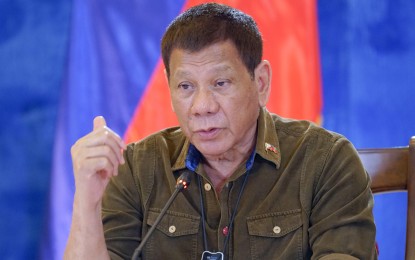
President Rodrigo Roa Duterte (File presidential photo)
MANILA – Malacañang on Thursday raised the possibility that President Rodrigo Duterte may still be the first person to be inoculated with China’s Sinovac Covid-19 vaccine to boost people’s confidence in the preventive medication.
In a press briefing, Presidential Spokesperson Harry Roque said Duterte has repeatedly expressed willingness to receive vaccines from either China or Russia to show that they are safe and effective despite concerns raised by critics of the administration.
“Hindi naman po out of the question na magpapauna siya magpabakuna kung kinakailangan na palakasin yung kumpiyansa ng ating mga taongbayan (His being first to get inoculated with a vaccine is not out of the question if there is a need to build people’s confidence in the vaccine),” he said.
However, he said Duterte also wanted to give priority to Filipinos belonging to the “poorest of the poor” as they are the most affected by the impact of Covid-19 pandemic.
“Pero ang mensahe niya kahapon, kaya nga po natin ginagamit ang kaban ng taumbayan, kinakailangan iyong nakakaraming mga mahirap ang mauna na maisalba sa danger na magkasakit ng Covid-19 (But his message yesterday is that we’re using public funds so that majority of the poor will be prioritized to protect them from the dangers of contracting Covid-19),” he said.
Roque insisted that the Duterte administration is not favoring China-made vaccines over those produced in the United States and Europe.
“Wala tayong favoritism. Nagkataon hindi tayo masupplyan ng Pfizer kasi yung mayayamang bansa nabili na yung available stock ng Pfizer (We don’t have any favoritism. It just so happens that the rich countries bought all the available stock of Pfizer),” he said.
Regardless of vaccine brand, he emphasized that the priority of the administration is to get as many Filipinos inoculated at the soonest possible time.
“Basta maaprubahan po ‘yan ng [Food and Drug Administration], tabla po ‘yan pagdating sa kaligtasan at pagiging epektibo kasama po ng mga brands na galing sa mga Western companies (As long as it is approved by the FDA, they tie in terms of safety and effectiveness with brands from Western companies),” he said.
He also pointed out that besides Sinovac, the country is also waiting for doses coming from other suppliers.
“Hindi naman ibig sabihin palibhasa papasok ang Sinovac sa Pebrero, titigil na tayo ng effort makaangkat pa ng bakuna sa ibang manufacturers (It doesn’t mean that since we will have Sinovac by February, we will stop making efforts to procure vaccines from other manufacturers),” he said.
Roque also defended anew the decision to purchase Sinovac vaccines, citing reports that these had a high efficacy rate recorded in Indonesia.
“Sa mga clinical trials, importante na magamit yung bakuna sa kapareho niyong ethnicity kasi nga po yung genetic makeup. E ang Pilipino at mga Indonesians po, pareho tayong Malay. So kung napatunayan 91.25 [percent] effective po ang bakuna sa Indonesia, na kapwa Malay natin, baka ganun din po ang magiging resulta kung magbakuna tayo dito sa Pilipinas (In clinical trials, it’s important that the vaccine will be used on people with the same ethnicity because of genetic makeup. Filipinos and Indonesians are both Malays. So if the vaccine is 91.25 percent effective in Indonesia, our fellow Malays, it may have similar results if used in the Philippines),” he said.
Earlier, Roque announced that the country has secured 25 million doses of Sinovac vaccines, with the first 50,000 doses expected to arrive in February.
Vaccine czar Carlito Galvez Jr. also said that besides Sinovac, vaccines developed by US pharmaceutical company Pfizer and United Kingdom's AstraZeneca may also arrive in the country by February.
In a taped speech on Wednesday night, Duterte declared that vaccines produced by China are “as good as” those produced in the US and Europe. (PNA)
